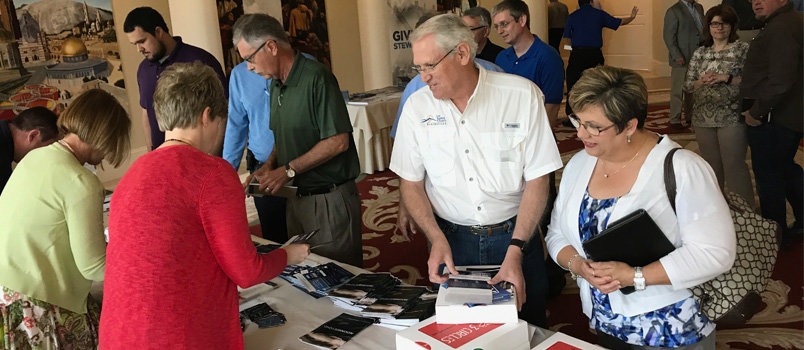 Fred Lodge, senior pastor at First Baptist Church of Blairsville and Children's Minister Debbie Braswell, register for the May 18 conference. They were accompanied by fellow staff minister and Minister of Music Ed Lawrie. JOE WESTBURY/Index
Fred Lodge, senior pastor at First Baptist Church of Blairsville and Children's Minister Debbie Braswell, register for the May 18 conference. They were accompanied by fellow staff minister and Minister of Music Ed Lawrie. JOE WESTBURY/IndexDULUTH — Johnny Hunt may not know everything about pastoring, but after 40 years in the ministry he does know a thing or two because he’s seen a thing or two.
The more than 300 in attendance at the May 18 Moving Beyond seminar at the Georgia Baptist Missions and Ministry Center offered a variety of insights into evangelism, stewardship, pastoring, discipleship, church health, and church growth. And that information was gleaned from the gamut of congregation sizes, ranging from his first church – a 35-member congregation which grew to 115 in Gaffney, SC – to his three decades at First Woodstock, which averages 6,000 in weekly attendance.
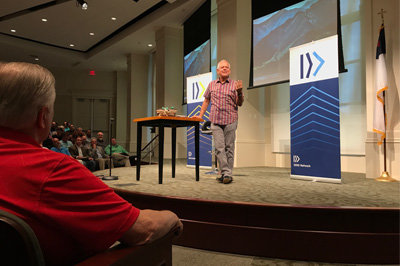 Johnny Hunt, pastor of First Baptist Church of Woodstock, was keynote speaker at the seminar attended by more than 300 pastors, staff, and laity. It was the third year the conference, sponsored by the North American Mission Board and the Georgia Baptist Mission Board, was hosted at the Duluth headquarters building. JOE WESTBURY/Index
Johnny Hunt, pastor of First Baptist Church of Woodstock, was keynote speaker at the seminar attended by more than 300 pastors, staff, and laity. It was the third year the conference, sponsored by the North American Mission Board and the Georgia Baptist Mission Board, was hosted at the Duluth headquarters building. JOE WESTBURY/Index“I love pastors. If there is one thing people who know my heart will quickly agree on, it’s my love for ministers and the challenges they face. I want to help you any way I can in sharing what I have learned through my years in the ministry,” he told the group packing the chapel at the Duluth headquarters.
The conference, sponsored by the Georgia Baptist Mission Board and the North American Mission Board, is in its eighth year and has grown to include 8 to 10 states each year. The meeting hosted at the Missions and Ministry Center was the fifth consecutive year in Georgia and the third at the Duluth building. It was also the most heavily attended of any of the five, noted state missionary Larry Wynn.
Jim Law, administrative pastor at First Woodstock, said the Georgia conferences are one of the best attended. Pastors from neighboring states drove to the Atlanta suburb to participate in the seminar, which began at 10 a.m. and concluded at 3 p.m. While the gathering covered a variety of topics, it focused on leadership and church revitalization and was designed to help plateaued churches move to the next level of growth.
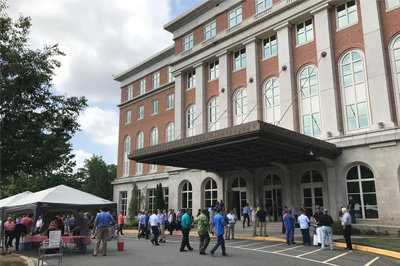 Pastors, staff, and laity from across the state attended the meeting. A morning break on the campus gave attendees an opportunity to stretch their legs and compare notes. JOE WESTBURY/Index
Pastors, staff, and laity from across the state attended the meeting. A morning break on the campus gave attendees an opportunity to stretch their legs and compare notes. JOE WESTBURY/IndexThe meeting was designed for church staff members and laity who wanted to avoid the pitfalls of becoming comfortable with being in a church that had experienced growth but had entered a time of stagnation. Hunt explained that such an event was natural in the life of a church but cautioned against the resting place becoming a graveyard.
Hunt began by explaining that his comments would not focus as much on church growth as church health, “because if you have a healthy church you are going to grow. So much of church depends on leadership that has a vision and shares that vision with the men and women in the pew.”
He downplayed the idea that a pastor has to be in a “growth pocket … a location that is fast growing with employment and families moving into the community, much of how metro Atlanta is described.
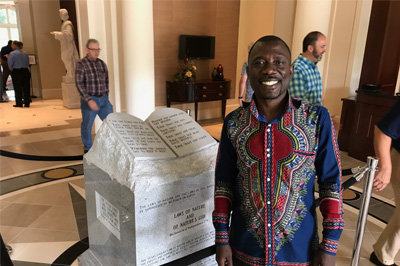 Church planting is not easy, though it is very rewarding. That's why Powder Springs pastor Kwame Frimpong attended the meeting. A native of Ghana, West Africa, Frimpong said he wants to "take my 30-member congregation to the next level. We need to get off the plateau and become more serious about discipleship and stewardship." He is pastor of Power House International. JOE WESTBURY/Index
Church planting is not easy, though it is very rewarding. That's why Powder Springs pastor Kwame Frimpong attended the meeting. A native of Ghana, West Africa, Frimpong said he wants to "take my 30-member congregation to the next level. We need to get off the plateau and become more serious about discipleship and stewardship." He is pastor of Power House International. JOE WESTBURY/Index“There are dying churches in Atlanta and growing churches in rural areas of the state. Do not believe that if you can’t grow a church in Atlanta you can’t grow one anywhere,” he stated.
Hunt repeated the oft-cited statistics that 85 percent of churches are plateaued or declining, and that many have simply not faced that fact. Some would rather die than consider change.
“That’s why we bury 17 churches every week, 900 every year in the Southern Baptist Convention. Nationwide, 10,000 churches of all denominations go ‘out of business’ and close their doors forever.”
The Southern Baptist birth rate of new churches “is nowhere near its death rate,” signaling a steady decline in the denomination’s influence in society.
The Lumberton, NC native then spent the next few hours sharing a plan “that is very easy to replicate."
He then shared observations about eight major changes in churches in the past decade, as observed by LifeWay Christian Resources President Thom Ranier. Hunt expressed the need for pastors to be flexible to change and current with shifting methods of communicating the gospel without compromising the message.
Those changes included:
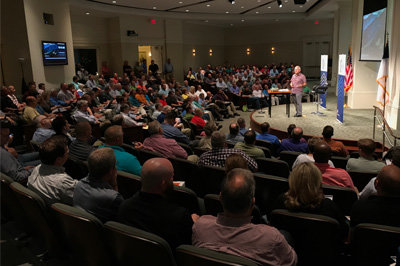 A capacity crowd of 300, with some viewing the conference live streamed to an overflow room, packed the Georgia Baptist Mission Board chapel. JOE WESTBURY/Index
A capacity crowd of 300, with some viewing the conference live streamed to an overflow room, packed the Georgia Baptist Mission Board chapel. JOE WESTBURY/IndexWhile Hunt took time to comment on all eight shifts, he did expound on a couple.
For example, he noted that while First Woodstock has three morning services, if he was starting over he would operate out of a far smaller building. He also noted that many new churches are moving away from building adult Sunday School space and moving that into homes and small groups during the week.
He observed that community fear of a decade ago has now moved toward community focus. “Do you know who lives within a 3- to 5-mile radius of your church? We need to move into our communities and meet their needs. International missions is great but it makes no sense for someone to raise $2,000 to fly around the world to share the gospel with someone whose language they do not speak, but will not walk across the street to share with their neighbor.”
He then commented on “the vital importance of groups. We know that we will lose you, as a new member, if you do not get involved within your first year. If you do connect with a Sunday School class or small group you will remain for at least three to five years.”
He bemoaned the idea a decade ago about the “degree and done” mentality. Now pastors need to be continuous leaners to stay relevant and fresh. Hunt mentioned that 85 percent of high school graduates never read a book after graduation.
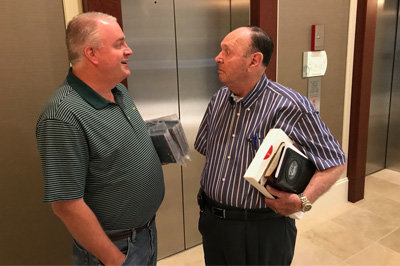 Ken Burnett, left, worship and family minister at First Baptist Church of Blue Ridge, and Willard Watson, pastor at Mt. Tabor Baptist Church near Stratham in Jackson County, visit prior to the day seminar. The two said they wanted to brush up on leadership techniques and explore how to lead their congregations to be more effective for the Kingdom. JOE WESTBURY/Index
Ken Burnett, left, worship and family minister at First Baptist Church of Blue Ridge, and Willard Watson, pastor at Mt. Tabor Baptist Church near Stratham in Jackson County, visit prior to the day seminar. The two said they wanted to brush up on leadership techniques and explore how to lead their congregations to be more effective for the Kingdom. JOE WESTBURY/IndexHe also discussed the importance for leadership with a vision in the local church. “Every church rises and falls on leadership. If there is a leadership vacuum, it will not remain that way for long … someone will step in to fill the void.”
Hunt then described how the principles that would be shared have a track record of being well received by churches that came to First Woodstock for assistance
One congregation had dwindled to 20 members and was no longer able to pay the salary of its bivocational pastor. After working with First Woodstock staff the congregation had grown to 270 members with $14,000 in tithes. “If you cast a vision the people will follow,” he added.
Another congregation – First Baptist Church of Panama City, FL – sought assistance when it had declined to 70 members and was receiving $1,500 in weekly tithes against $10,000 in expenses with a building in bad need of repair. Within four years it had grown to 350 members with $14,000 in receipts.
 Attendees relax and network during a morning break outside the Missions and Ministry Center. JOE WESTBURY/Index
Attendees relax and network during a morning break outside the Missions and Ministry Center. JOE WESTBURY/IndexStewardship is not based on the economy but on people’s hearts, he maintained. He then stated that during the Great Depression when people were starving and living hand-to-mouth, the nation’s average charitable giving was 3.6 percent. Today, in far more prosperous times, it has declined to 2.5 percent.
“There are plenty of people out there who need to hear the gospel. There is no shortage of lost people in your community,” he stated. “We have studied the demographics of our community and realized that there are 80 people for every empty seat in our sanctuary. There are plenty of people who need to be in your church.
“If heaven were to come down this Sunday and the 117,000 people within a five-mile radius of First Woodstock were to flood into all the churches of all faiths, we would only be able to accommodate 10 percent of the population. Then quoting the late Roy Fish, evangelism professor at Southwestern Seminary, he said, “Evangelism (and stewardship) is not taught, it’s caught.
“If God can save Saul of Tarsus, He can save anyone. If he can save Johnny Hunt, he can save anyone. If he can save you, he can save anyone.
“God wants to use you in building His Kingdom.”